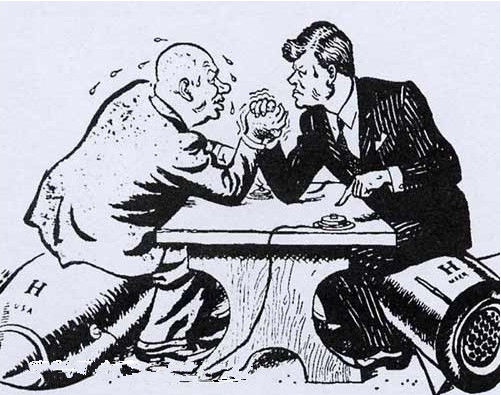Although NATO had similar missiles in Turkey pointed straight at the Soviet Union,
尽管北大西洋公约组织在土耳其也部署了类似的导弹,直指苏联
the US prepared for war — including possible yet another invasion of Cuba (this time with American forces).
美国做好了战争准备,包括可能发起另一次对古巴的入侵,当然是用美军部队
Finally, common sense won out.
但是最后还是常识获胜了
Kennedy presented Khrushchev with an ultimatum: get the missiles out.
肯尼迪向赫鲁晓夫下了最后通牒:撤出导弹
This Khrushchev did, no doubt saving the world yet again from a third world war complete with mutually assured destruction.
赫鲁晓夫照做了,无疑也挽救了世界,避免发起第三次世界大战造成世界毁灭
Khrushchev tried to portray the Soviet retreat as a victory.
赫鲁晓夫试着将苏联的撤退描绘成一个胜利

He claimed that the US had recognized Communist Cuba's legitimacy despite the Monroe Doctrine,
他宣称,虽然还有门罗主义,但是美国已经认可了共产党古巴的合法性
by requiring only that the missiles (and not the Cuban regime) be removed.
条件就是俄国撤出导弹而不是撤出古巴政权
But the USSR's military leaders and their hardline supporters didn't care about Khrushchev's fancy logic.
但是苏联的军事领导和他们的强硬派支持者并不在乎赫鲁晓夫的荒诞逻辑
They knew who had really won out in Cuba, and it wasn't them.
他们知道古巴事件中真正占上风的并非自己
Two years later, Khrushchev would be booted out of office and replaced by the glorious Leonid Ilyich Brezhnev.
两年后,赫鲁晓夫被赶下了台,取而代之的是列昂尼德·伊里奇·勃列日涅夫
From the Cuban Missile Crisis on, the Cold War took two basic forms: the war in Southeast Asia, which we will take up in the next lecture,
从古巴导弹危机开始,冷战有了两种基本形式,东亚的战争,也是我们下一讲要讲的内容
and the arms race, which we will take up here.
和军备竞赛,也就是我们接下来要讲的












